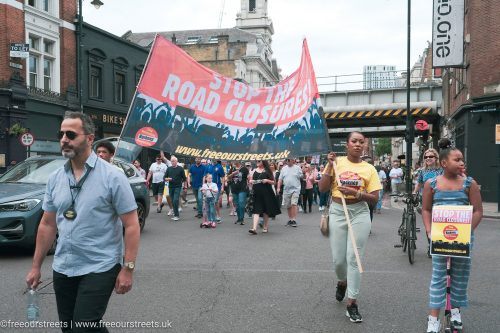Roadblock lockdown

by Martyn Perks
Now government health secretary Matt Hancock has been ousted, his replacement Sajid Javid looks like he’s ringing in the changes. No doubt a political move to try and bring about some certainty to when all Covid restrictions will be lifted.
After 16 challenging months of harsh restrictions that have affected communities, relationships, businesses in innumerable ways, it will be a moment we have all been waiting for—a chance to get our lives back to normal.
However, crucially, when the lifting of lockdown restrictions is imminent, why are local authority councils determined to keep us locked in with their Low Traffic Neighbourhood (LTN) road closures? When we all need as much help as we can get, won’t keeping countless roads blocked off will further hinder the chance of getting our lives back to normal that everyone deserves? For example, take the countless local businesses that have heroically managed to stay afloat during Covid. If LTNs remain in place, they will have to continue to bear the costs that closed roads add to their running costs.
 Recently I asked many local businesses in and around St Peters in Islington what the effects of LTNs have been on them. Shops, cafes, newsagents, greengrocers, and local services many local people rely upon all shared the same complaints.
Recently I asked many local businesses in and around St Peters in Islington what the effects of LTNs have been on them. Shops, cafes, newsagents, greengrocers, and local services many local people rely upon all shared the same complaints.
They all told me about the delays in delivering goods to customers that LTNs often cause them. How receiving deliveries are made much harder. And of how they are losing customers who are no longer able to drive to them or park nearby.
They told me of how their customers have complained of having to wait longer for orders to arrive. Being stuck in traffic caused by congested main roads is often cited as a cause of delays. One courier who had just delivered a parcel to my door told me that LTNs added another hour to his already long working day. All of these effects also have a knock-on cost to the local economy and infrastructure. Suppliers and trades that rely upon each other end up passing on additional costs to one another.
These stories are being repeated all over London and elsewhere wherever LTNs have been introduced. Only time will tell what the total costs of all this will be. And how many times have these additional burdens pushed businesses already struggling over the edge, forcing them to close? The same goes for job losses that occurred during lockdown.
Proponents will argue that the social benefits of LTNs far outweigh any economic costs, and they can be recouped over time as society recovers.
Eventually, we all move on. But that is not the point.
At the time of planning LTNs, councils had little or no evidence of the economic impact. How could they? There was no data available to base any decisions on. Indeed, using emergency traffic orders suited them because they did not need to bother to consult with anyone before rushing through each LTN scheme. If they had bothered to ask, they would have quickly realised that LTNs would have left many worse off – local businesses included. Now, some 16 months on, what will Islington Council do to help with the ravages that Covid’s lockdown restrictions have brought? It seems very little.
 When councils should be doing all they can to support local communities and businesses to get back to normal, we have the threat of more LTN schemes and existing ones made permanent. All of which begs the question: if Sajid Javid appears committed to getting our lives back to normal, why are our councils (elected to represent us) seem determined to keep us locked in?
When councils should be doing all they can to support local communities and businesses to get back to normal, we have the threat of more LTN schemes and existing ones made permanent. All of which begs the question: if Sajid Javid appears committed to getting our lives back to normal, why are our councils (elected to represent us) seem determined to keep us locked in?
Martyn Perks, former May 2021 Islington by-election independent candidate.
Photos: Niall Crowley
See also: “Letters: For & Agasint LTNs”: Islington Gazette






